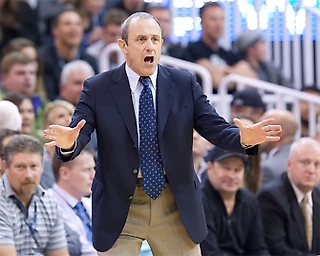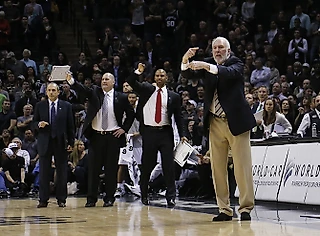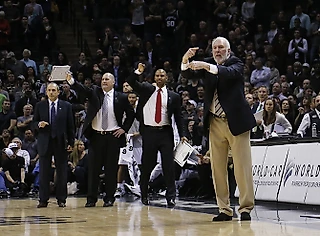Help to improve
Messina Online
It's important to distinguish between players who have potential and those who have already developed into good players.
A player can improve himself technically, physically and mentally. By mental improvement I mean the ability to play under pressure, to perform during crucial games and good overall understanding of the game. Those three aspects are interdependent.
For example, there are many young big men who are good at executing offensive moves. But they lack physical strength or the balance to play the same game, when they face aggressive defense with contact. Once you see such a drawback, you should concentrate more on the physical side. When a player makes progress both technically and physically, usually, it gives him more confidence. This helps him to grow up mentally, to become more stable.
When you teach young players, you need to develop your own teaching method at first. I think it's the most underestimated part of coaching job. No matter how thorough your knowledge of basketball is, you should have a teaching method.
Nowadays with all clinics, videos and even the possibility to attend practices, knowledge has enormously increased as compared to what it used to be 20-25 years ago.
The biggest part of developing a method is to select what to teach young players from a long list of different things. Usually, coach cannot communicate all his knowledge to a player, as it will create confusion. Moreover, the things you're trying to teach should be consistent with one another and should be put into a logical succession. Coach must take into consideration the level of the player as well. You cannot create expectations of huge improvements over a short period of time, as it might destroy player's mentality.
There is no secret at all. Help young players to advance step by step. Make sure every step is neither too difficult (it will cause frustration), nor too easy (it will be a waste of time). Offer slightly harder challenges every time to help your players to build confidence and gain knowledge.
This is the essence of any teaching method. If you don't have such a method, having the biggest knowledge in the world won't help. With no teaching method, you'll remain the only one who knows it.
Actually, there is no ideal teaching method. Everyone tries to find his own patterns that would work for him and his team. However there are two concepts that are common to every method: 1) the idea of making progress and 2) the need to select things you're trying to teach. What might differ from one coach to another is the pressure a coach puts on players, the way he treats their mistakes.
If you don't have a method or you're not clear or sure about the point you would like your players to progress to, they will lose confidence in you and in the ability to achieve something together.
The most popular method is called “try and error”. You try, you make mistakes and you learn from those mistakes. The most important part about this method is to select the right level of tolerance towards an error. If coach doesn't have any kind of tolerance, players become too cautious and don't even bother to try. If coach doesn't put any pressure on players, the learning process becomes futile. You need to find a good balance between the opportunity you give to players and the level of tolerance you have for mistakes.
All mistakes in basketball can be divided into two types - technical mistakes and mental mistakes. Technical mistakes are easy to recognize. Mental mistakes are mainly caused by the lack of attention or understanding what's going on the floor. Unfortunately, I have a very low level of tolerance for mental mistakes, and sometimes I realize I'm putting too much pressure on a player. Believe it or not, I'm still trying to get better in this part of my job. Anyway, it's important to explain to players the difference in the way you treat both types of mistakes.
At the same time I think the player's personality plays a great role in the process. If you are a player and you want to improve significantly, you should put pressure on yourself to work on eliminating mental mistakes. The difference between an average player and a great player is that a great player has a very clear idea of what a mental mistake is. He works to cut down the number of mental mistakes.
Try to understand the mistakes you make and work hard to correct them. This is the only way to advance to the next level. Start by defining your mistakes. Great players immediately recognize their mistakes and either try to avoid them or correct them quickly.
One of the most frustrating things is coaching players who always make the same mistakes. It might be for two reasons. Either the player doesn't have a minimum level of talent, or, worse, he doesn't have attention and desire to improve.
There are two ways of coaching. You can either give players precise instructions to follow or you can teach them how to understand the basic principles so that they can recognize different situations and react accordingly. Good coach can teach how to think. I've always felt that a good coach can teach you how to use your mind in basketball. Of course, using your mind is more difficult, as it assumes more responsibility.
Here is another key point. I learnt this one from Hubie Brown. Terminology is very important. If I want to teach you something, we need to share the same understanding of the words we use at least at the beginning. Basic terminology is a must have for your teaching method. If you don't care about people understanding what you share with them, you'll end up in a huge cathedral of ideas, but you'll be the only one who lives in there. So you need terminology to open the door.
It's imperative that young players have experienced teachers. In my country young players are taught by young coaches due to economic reasons. It's absolutely against the theory of teaching. The younger the pupil is, the more experienced should the teacher be. We are lucky in CSKA to have an experienced coach Ratko Joksic from Serbia, who help all our young coaches.
Of course, young coaches cost less, but players pay for their mistakes by their own careers. I was put to coach young players at 17. I was lucky to have my career started this way, but, unfortunately, some of my players paid for my mistakes.
The biggest problem of many young coaches is that they haven't developed a method yet. You don't have a vision of the progress you would like to help your players to make. You become irritated by other peoples' mistakes and you find it difficult to control your emotions. It's risky for both young coach and the players.
Coach profession is about evolving all the time. You cannot stop thinking how to improve your ability to communicate concepts to other people. It's essential if you want to be a coach who develops players.
It's completely different if you want to be a coach who just uses the abilities of other people. You can coach and help your players to improve or you can coach and just use their abilities. It depends on what you want to do, on your vision of yourself and your role. Eventually, it goes back to your character, abilities and background.
What makes the greatest players special? Their personality and their ability to play under pressure.
You can try to help your players to develop personality, but only if they want to. If they don't want to, you cannot do anything. Becoming a Jiminy Cricket, a wise partner who gave Pinocchio reasonable pieces of advice, won't help. I don't want to be a Jiminy Cricket for my players. By the way, he ended up being smashed by Pinocchio.
When they ask me the difference between a great player and a champion, I always say: a champion is a great person who is a great player.




